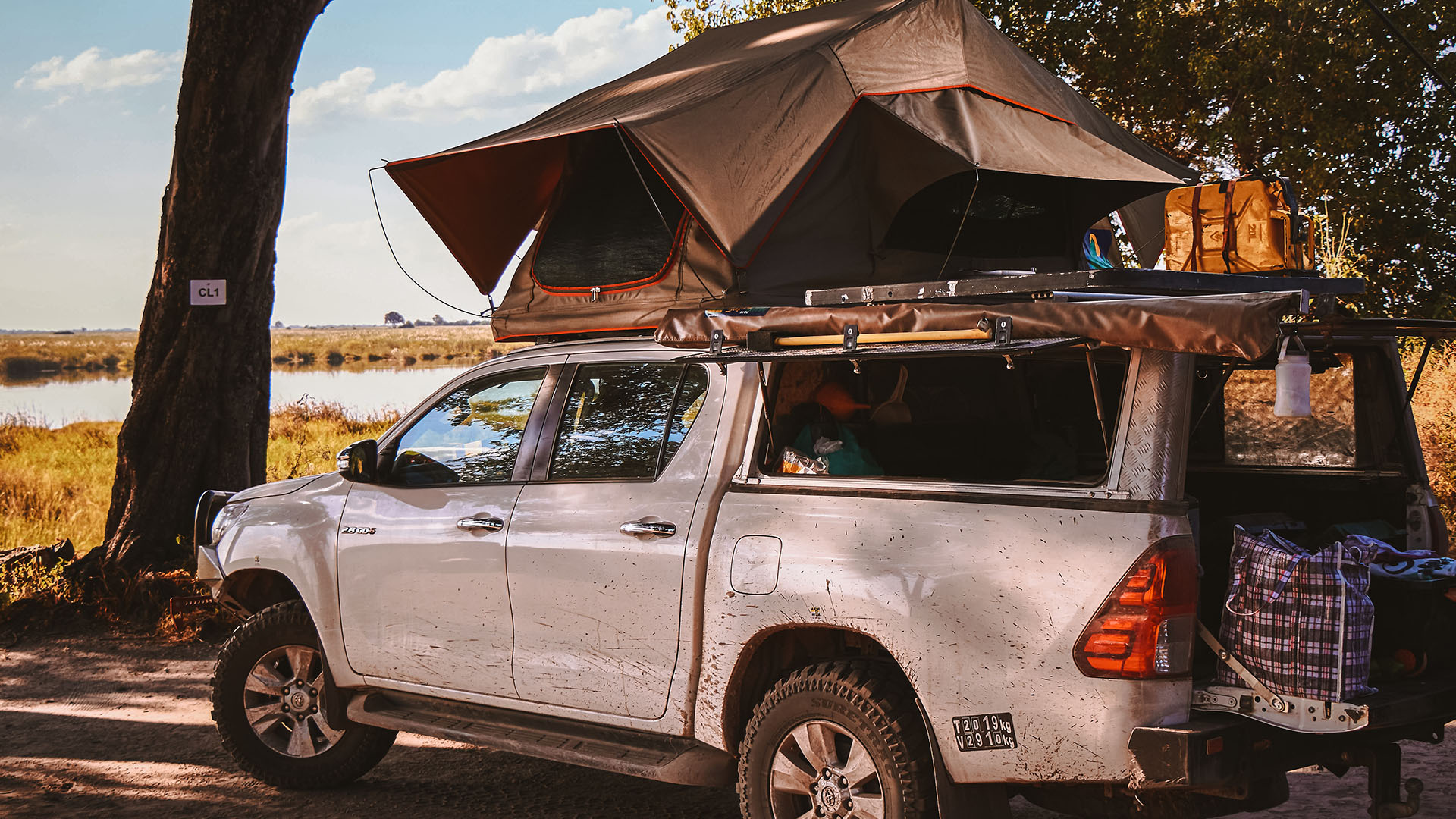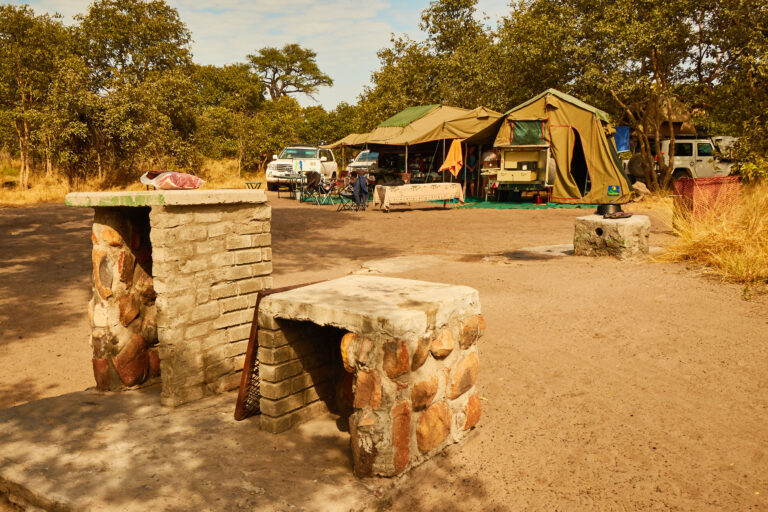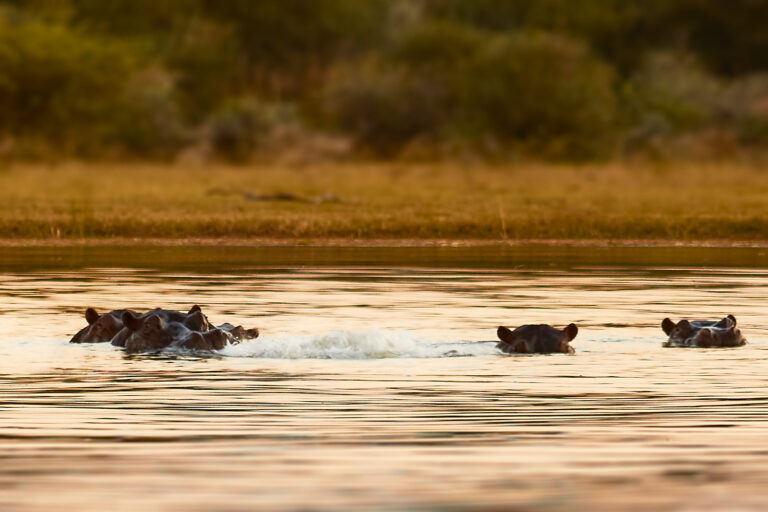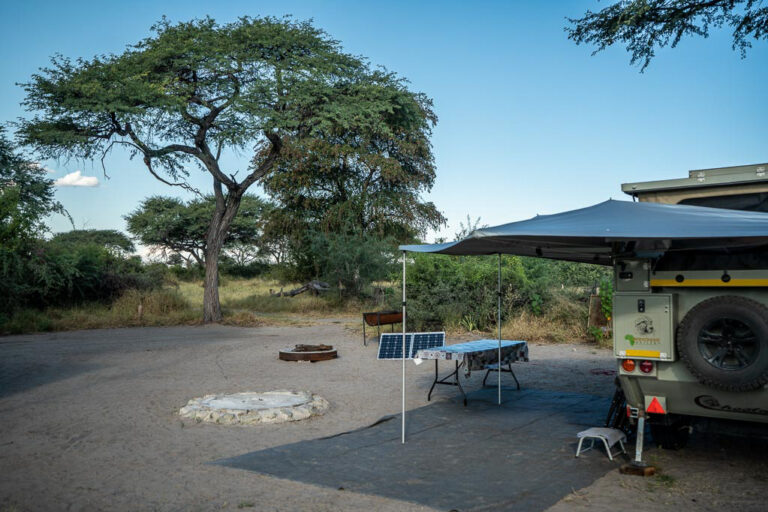Going on a camping trip in Botswana is more than just a holiday, it’s a transformative journey into the heart of Africa’s wild and untamed beauty. Known for its pristine landscapes, abundant wildlife, and unique safari experiences, Botswana offers adventurers a rare chance to disconnect from the modern world and reconnect with nature in its purest form.
Whether you’re a seasoned safari enthusiast or a curious solo traveler, camping in Botswana promises unforgettable encounters with wild animals, breathtaking scenery, and a deep sense of freedom that only the African wilderness can provide.
This guide explores why camping in Botswana should be at the top of your travel list and what makes it a truly exceptional adventure.
Introduction to Camping in Botswana
Botswana is one of Africa’s premier camping destinations, offering a blend of untouched wilderness, abundant wildlife, and awe-inspiring landscapes.
For nature lovers and adventure seekers, a Botswana camping safari provides an authentic experience where luxury lies in the thrill of being close to nature rather than in five-star amenities. Whether you opt for a guided tour or a self-drive adventure, camping in Botswana immerses you in the rhythm of the wild.
Camping in Botswana offers a unique experience, providing travelers with the opportunity to enjoy an unparalleled and unforgettable adventure in one of the world’s most remarkable natural settings.
Top 10 Reasons to Go Camping in Botswana
1. Wildlife in Its Purest Form
Imagine waking up to the distant call of a fish eagle or hearing elephants foraging near your tent under the moonlight. Botswana offers an unparalleled opportunity to witness wild animals in their natural habitat, free and unfenced. From lions lazing in the shade to herds of elephants crossing riverbeds, campers often find themselves in the heart of the action, far from tourist crowds.
During the dry winter season, animals gather near water sources, making wildlife viewing especially rewarding. It’s not uncommon to have your breakfast interrupted by a curious antelope or your sleep briefly disturbed by a lion’s roar in the distance.
When encountering wild animals up close, it’s important to stay calm and respect their space for a safe and memorable experience.
2. Pristine, Untouched Landscapes
Botswana has long prioritized conservation, resulting in vast, protected wilderness areas. The landscape remains as nature intended, rugged, raw, and breathtaking.
Whether you’re surrounded by the lush channels of the Okavango Delta, the savannahs of Moremi, or the golden grasslands of the Central Kalahari, camping lets you experience these settings at ground level, offering a deep sense of immersion in the wild.
Adventurous travelers can discover hidden gems and enjoy wild camping in remote areas, adding to the authenticity of the journey.
3. Freedom and Flexibility
Self drive camping gives adventurers the freedom to chart their course through Botswana’s spectacular scenery.
Going on a self drive safari means you can tackle sandy roads and explore at your own pace, but it’s essential to have basic mechanical skills to handle any challenges along the way. No strict schedules, no tour buses, just you, your map, and the open bush.
This flexibility allows for spontaneous detours to hidden waterholes, quiet sundowners by forgotten pans, and uninterrupted moments of solitude in places many will never reach. For safety, it’s best to avoid driving at night due to the presence of wildlife and poor road conditions.
A road trip through Botswana is a classic adventure, offering unparalleled freedom and discovery.
4. Stargazing in the Wilderness
Botswana’s night skies are a revelation. With minimal light pollution in most campsites, the heavens open up to reveal constellations, shooting stars, and the Milky Way in all its glory.
The rhythm of the sun shapes daily life in the bush, often encouraging campers to bed early and rise with the dawn.
Sitting around a campfire under this vast dome of stars, with the sounds of the night echoing in the background, creates an emotional and almost spiritual experience.
5. Budget-Friendly Safari Experience
Camping is a cost-effective way to experience the magic of Botswana’s wild places.
While luxury lodges can cost hundreds or thousands per night, well-equipped campers can explore the same terrain, see the same wildlife, and enjoy the same views, often with greater intimacy and authenticity.
You can set up your tent at all the campsites, which typically offer basic amenities such as limited electricity, running water, and often no wi fi, enhancing the rustic charm.
Camps in Botswana are usually rustic and eco-friendly, providing an authentic back-to-nature experience. It’s a safari for the soul and the pocket.
6. Immersive Cultural Encounters
Botswana’s people are as much a part of the landscape as the wildlife.
Camping in community-run campsites or engaging with local guides offers a valuable cultural exchange experience. Booking through private operators is often necessary, and it’s wise to plan, even weeks in advance, to secure your spot, especially during peak seasons.
These experiences deepen your understanding of Botswana’s heritage and highlight the importance of sustainable, responsible tourism that benefits local communities.
7. Variety of National Parks to Explore
From Chobe National Park’s elephant herds to Moremi’s delta channels, every region offers a new adventure.
The Central Kalahari’s wide-open plains present a stark contrast to the watery maze of the Okavango. Each ecosystem supports a unique flora and fauna, and campers have the rare privilege of exploring them on foot, by boat, or from the comfort of a 4×4 vehicle.
The Savuti campsite in Chobe is a notable spot for wildlife viewing, offering close encounters with nature in a prime location.
8. Exclusive, Low-Impact Tourism
Botswana’s tourism model is built on low-volume, high-quality travel.
This means fewer people and more privacy. Many camping spots are located in remote concessions with limited access, which preserves the environment and ensures that your wilderness experience remains undisturbed.
The campsite experience in Botswana, with its basic facilities and proximity to wildlife, contributes to a truly memorable camping experience. This model is a win-win: guests enjoy exclusivity, and nature thrives.
9. Adventure for Every Kind of Traveler
Camping in Botswana isn’t just about sitting around a fire. You can choose your own adventure, thrilling game drives, peaceful mokoro rides, heart-pounding walking safaris, and awe-inspiring birdwatching.
The range of adventures includes the possibility of encountering an angry hippo during a Botswana safari, adding excitement and unpredictability to your journey.
Whether you’re a seasoned overlander or a first-time camper, there’s an activity to match your pace and preferences.
10. Personal Growth and Connection with Nature
There’s something transformative about sleeping under the stars, cooking your meals over a fire, and navigating the bush with minimal interference from modern life.
In the wild, such things as sleeping in are rare when visiting Botswana, as the natural environment encourages early rising and embracing each exciting day.
A trip to Botswana is a fantastic experience, filled with personal growth, a connection to nature, and unforgettable moments. Camping in Botswana strips away distractions and reconnects you to what truly matters: nature, companionship, and self-reliance. It’s not just a vacation; it’s an awakening.
Choosing the Right Destination
Botswana is dotted with incredible parks and reserves, each with its unique charm. If you are planning to visit Botswana, consider the best destinations for unforgettable wildlife experiences:
The Okavango Delta, a UNESCO World Heritage Site, is a vast wetland teeming with wildlife and lush vegetation. Its network of channels and islands makes it ideal for mokoro (dugout canoe) excursions and water-based safaris.
Moremi Game Reserve, located within the Okavango Delta, combines floodplains and forests, attracting an astonishing array of birds and mammals. It’s perfect for self-drive or guided camping experiences, and a game drive here is a must for spotting diverse wildlife.
Chobe National Park is Renowned for having one of the largest elephant populations in Africa. Chobe is a fantastic destination for riverfront camping and thrilling game drives. The Chobe River serves as a vital lifeline for wildlife, particularly during the dry season.
Choosing the right destination depends on what you’re looking for. The dry season (May to October) is best for game viewing, while the green season (November to April) offers dramatic landscapes and excellent birding. When visiting these parks, timing your trip can make a big difference for optimal wildlife viewing.
Preparing for Your Trip
Thorough preparation is key for a successful Botswana trip or Botswana safari:
- Basic Skills: Especially for a self drive safari, it’s essential to have basic mechanical skills, such as changing tires, and understand how to navigate isolated areas and remote regions.
- Equipment: Pack essentials such as a sturdy tent, spare batteries, cooking gear, first aid kit, and warm clothes or layers of clothing for cold nights.
- Logistics: Pre-book campsites, especially in high season. Consider hiring a local tour operator for guided safaris, transfers, and deeper cultural immersion.
- Essentials: Bring enough water, non-perishable food, and fuel. Be aware of the weather and wildlife, and always plan for emergencies.
What to Expect from Campsites
Botswana’s campsites vary from rustic to semi-equipped:
- Bush Campsites: Many are unfenced and basic, offering little more than a patch of land and perhaps a fire pit. These offer the most intimate wildlife experiences but require extra vigilance. At many sites, there is no electricity, running water, or Wi-Fi, so campers must come prepared for a truly off-grid experience.
- Designated Areas: Expect clear areas for pitching tents, and in some cases, ablution facilities and boreholes for water. All the campsites generally share basic facilities such as water taps and ablution blocks, and travelers often set up their own tent at each campsite.
- Wild Encounters: Animals like elephants and hyenas may pass through at night. Campers must follow safety protocols and never leave food unsecured.
These campsites provide raw, unfiltered access to Botswana’s wild landscapes. For those seeking the most immersive adventure, wild camping in remote areas offers a truly authentic experience, with minimal facilities and close encounters with nature.
Safety Precautions
Staying safe in the wild is paramount:
- Avoid Night Travel: Roads are unlit, and nocturnal wildlife may be active. It is best to avoid driving not only at night but also in remote or challenging conditions to ensure your safety and maximize your wildlife viewing experience.
- Respect Wildlife: Keep a safe distance, stay in your vehicle during sightings, and never attempt to feed animals. If you encounter animals up close, remember to stay calm to avoid startling them and to keep yourself safe.
- Emergency Readiness: Carry a well-stocked first aid kit, satellite phone or radio, and share your itinerary with someone you trust.
- Listen to Guides: If you’re on a guided safari, always follow the guide’s instructions, especially in predator zones.
In the wild, there is no such thing as ignoring safety protocols—always remain vigilant.
Activities and Experiences
Camping in Botswana offers a diverse range of adventures, where each exciting day brings new opportunities for memorable encounters and contributes to an unforgettable camping experience:
- Game Drives: Experience the thrill of a game drive at dawn and dusk for the best chance to see lions, leopards, elephants, and buffalo. Guided or private game drives offer close encounters with wild animals, and you might even spot an angry hippo along the way.
- Walking Safaris: Led by professional guides, these allow you to track animals and learn about the ecosystem from a ground-level perspective.
- Boat Safaris: Particularly in the Okavango Delta and Chobe, boat trips give you a unique vantage point to view animals.
- Birdwatching: With over 590 bird species, Botswana is a birder’s paradise, especially during the green season.
- Cultural Interaction: In some regions, you can engage with local communities and learn about traditional ways of life.
National Parks and Reserves
Botswana’s parks are some of Africa’s finest, and a Botswana safari offers access to these incredible parks and reserves:
- Chobe National Park: Famous for elephants and river cruises. The Savuti campsite is a prime location within the park, offering excellent opportunities for wildlife viewing due to its proximity to abundant animals.
- Moremi Game Reserve: A rich mosaic of habitats.
- Central Kalahari Game Reserve: A starkly beautiful desert landscape.
- Makgadikgadi Pans: Ideal for dry-season quad biking and meerkat encounters. During the dry winter season, animals gather near water sources, making it an excellent time to visit for wildlife viewing.
Each area is a treasure trove of biodiversity and natural beauty, making every stop on your camping safari a memorable experience. Camps in these parks provide an authentic experience close to nature.
Sustainable and Responsible Camping in Botswana
Camping in Botswana’s legendary national parks such as Chobe National Park and Moremi Game Reserve is more than just an adventure; it’s a privilege that comes with a responsibility. The incredible experience of a Botswana camping safari is only possible because these wild places have been carefully protected and respected for generations. As a camper, your actions play a vital role in preserving the delicate balance of nature and ensuring that future adventurers can enjoy the same breathtaking encounters with wildlife.
Sustainable camping in Botswana means treading lightly on the land. Always use designated campsites, minimize your impact by packing out all waste, and avoid disturbing the natural environment.
Respecting wildlife is paramount observe animals from a safe distance, never feed them, and keep noise to a minimum to let nature’s rhythms prevail. By following these simple guidelines, you help maintain the pristine beauty of Botswana’s parks and safeguard the habitats of all the wildlife that call them home.
Supporting the local economy is another key aspect of responsible camping. Choosing local guides, booking community-run campsites, and purchasing supplies from nearby villages not only enriches your safari but also empowers local people and contributes to conservation efforts. Every decision you make from where you camp to how you interact with nature shapes the future of Botswana’s wild spaces.
Ultimately, camping in Botswana is about more than just seeing the sights; it’s about becoming a steward of the land. By embracing sustainable practices, you ensure that your adventure leaves a positive legacy, allowing the magic of Botswana’s national parks to inspire and amaze for generations to come.
Health and Safety
To stay healthy and safe while camping:
- Vaccinations: Consult your doctor about required vaccines and malaria prophylaxis.
- Hydration & Nutrition: Bring sufficient clean drinking water and healthy snacks.
- Sanitation: Pack personal hygiene supplies and biodegradable soap, as many campsites may not have running water.
- Stay Alert: Be aware of animal behavior, never wander off alone at night, and always stay calm during unexpected wildlife encounters.
In the wild, there is no such thing as guaranteed comfort or predictability.
Budgeting and Planning
Careful planning is essential for a successful trip to Botswana and for a smooth visit. Camping is one of the most budget-friendly ways to explore Botswana:
- Costs: Vary based on the season, number of parks visited, and whether you choose guided or self-drive options. Camps are a budget-friendly accommodation option, offering authentic wildlife experiences and a comfortable stay close to nature.
- Advance Booking: Campsites, especially in popular parks, fill up quickly. Reservations with private operators may need to be made even weeks in advance to secure your spot.
- Local Economy: Supporting local guides and campsites contributes to conservation and community development.
- Eco-Friendly Practices: Leave no trace, dispose of waste properly, and respect park regulations.
Conclusion
Camping in Botswana is not just a trip it’s an unforgettable journey into one of Africa’s last true wildernesses. From the pulse-raising thrill of a lion’s roar echoing through your tent walls to the peaceful solitude of sunrise over the Delta, every moment connects you more deeply with nature.
Whether you’re seeking raw adventure, spiritual renewal, or just the chance to unplug and explore, Botswana delivers in full. Start planning today, and prepare for the camping trip of a lifetime.
Frequently Asked Questions (FAQ)
Why go camping in Botswana instead of staying in lodges?
Camping in Botswana offers a more immersive and authentic experience, allowing you to be closer to nature and wildlife. It’s often more budget-friendly and provides the freedom to explore remote areas at your own pace, which lodges cannot always offer.
Do I need a 4×4 vehicle for camping in Botswana?
Yes, a 4×4 vehicle is highly recommended, especially for self drive camping. Many national parks and remote campsites have sandy or rough roads that require a well-equipped 4×4 to navigate safely.
When is the best time to go camping in Botswana?
The dry winter season, from May to October, is an ideal time for wildlife viewing, as animals congregate near water sources. However, the rainy season (November to April) offers lush landscapes and excellent birdwatching opportunities.
Is it safe to camp alone in Botswana?
While Botswana is considered a safe destination for solo travelers, camping in remote areas requires preparation, basic mechanical skills, and knowledge of wildlife safety. Joining guided safaris or traveling with others is often recommended for added security.
What should I pack for a camping trip in Botswana?
Essential items include warm clothes for chilly nights, sturdy camping gear, a first aid kit, spare batteries, insect repellent, sufficient water, and basic mechanical tools if self driving. Packing light but smart is key.
Are campsites fenced and secure?
Most campsites in Botswana are unfenced, allowing wild animals to roam freely in the vicinity. This creates a unique experience but requires campers to follow strict safety protocols and remain vigilant.
Can I camp anywhere in Botswana’s national parks?
No, camping is only allowed in designated areas and campsites. Wild camping outside these zones is prohibited to protect both visitors and wildlife.
How far in advance should I book campsites?
It’s advisable to book campsites well in advance, especially during peak seasons, as spots fill quickly. Some private operators may require reservations even weeks ahead.
Is there Wi-Fi or electricity at campsites?
Most campsites offer limited or no electricity and typically no Wi-Fi. This enhances the off-grid experience but requires campers to be prepared with flashlights and spare batteries.
What wildlife can I expect to see while camping in Botswana?
Botswana boasts diverse wildlife including elephants, lions, leopards, hippos, and a variety of bird species. During the dry season, animals gather near waterholes, making sightings more frequent and spectacular.
